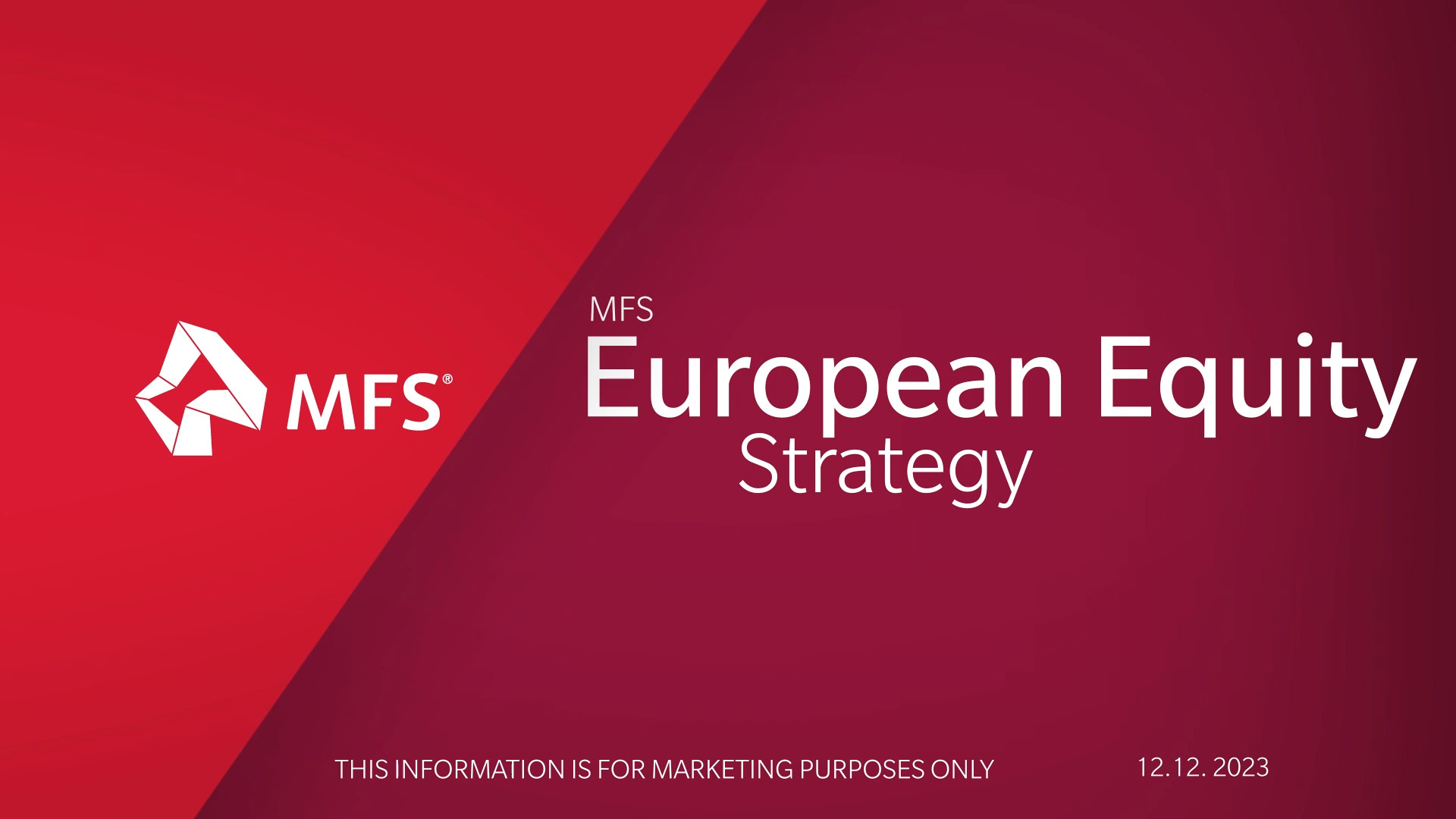MFS European Equity strategy
Florence Taj, European Equity portfolio manager, provides insights on the strategy and the characteristics she looks for when selecting stocks for the portfolio.
Teo Gianinazzi:
Thank you for joining. My name is Teo Gianinazzi, and today I'm here with Florence Taj, portfolio manager at MFS of the European equity strategy that we would like to discuss today. Before I'm going to ask Florence some questions, I have a question for you.
Do you know who invented the mutual fund? Well, it was us. In 1924, MFS launched the very first mutual fund in history. Forward to 2024, and we are going to celebrate our 100th anniversary. MFS stands for Massachusetts Financial Services. And if you're not familiar with our company, there are three key aspects that I'd like you to remember.
Number one, we are active managers and we follow a fundamental investment approach. Number two, we believe that managing the downside risk is key, and we put a lot of emphasis on data. We want to make sure that the risks that we are taking are all intended risks. And number three, at the end of the day, we believe it's key to know what you own, what that is worth, and then have the confidence to let time play out and use your insight to generate attractive returns. Now, going back to the European Equity Strategy. Florence, what is the goal of the European Equity Strategy?
Florence Taj:
So the goal of the strategy is to create attractive long-term returns for our shareholders by building an active portfolio of European stocks on the fundamental basis and bottom-up basis. What we look for are companies that are fundamentally undervalued by the market. Not necessarily companies that trade on a low P/E or low price-to-book, but companies that have extremely valuable businesses that are not being valued as such.
Those great businesses tend to have unique characteristics such as high investment in R&D, very recognizable brands, a very strong cost position, and they're very entrenched with their customers and tend to have very high recurring revenues. We also need to be comfortable with the management and their track record and the capital allocation.
Oftentimes, we come across opportunities in those stocks where the market is worried about short-term issues, which we think are not that important for the long-term of the company. Ultimately, our goal is to build a portfolio of 50 to 75 companies with those characteristics.
Teo Gianinazzi:
Thank you. How do you go about stock selection?
Florence Taj:
Most market participants tend to worry about very short-term issues. What is going to be the next quarter? Are they going to beat expectations or miss expectations? This is not our approach at all. We try to do a fundamental analysis of the company and look at the long-term prospects of the company.
We are very fortunate at MFS in that we have an extensive global research platform of analysts and portfolio managers. That allows us to really go in-depth in analyzing companies, really understanding the fundamentals, the history, and what drives the stocks. I would like to maybe give you an example to bring it all to life.
I would like to talk about a company called Novozymes that we recently introduced to the portfolio. Novozymes is a dominant leader in enzymes. They have a 50% market share, and enzymes are used in a number of applications. For example, household goods, agriculture, energy. The business tends to grow because it's supported by attractive long-term secular trends.
For example, if you use enzymes in washing liquid, you can actually wash laundry at a much lower temperature, which is very energy efficient. So this business has good long-term growth prospects. Novozymes is the leader. They have very strong margins already, but a new CEO came in three years ago and is aiming to really improve R&D productivity and to push those margins further for the company and revitalize growth.
They've also recently merged with Christian Hansen, which is a sister company in Denmark, which is focused on microbial fermentation, which is a very complementary business to enzymes. We think this is actually a fantastic deal, but the markets did not like it because of the high price paid for Christian Hansen. Therefore, the stock came down significantly, which gave us a great entry opportunity into that stock.
When we put the two companies together, the resulting P/E is actually one of the lowest that this company has traded at on the five to 10-year view, even though we think its prospects are much improved. This is a good example of how we bring to bear our research platform to find ideas and find unique opportunities like Novozymes.
Teo Gianinazzi:
Why should investors consider this strategy?
Florence Taj:
I think that this unique investment approach will help us generate superior returns over the long term for our shareholders. I think MFS is uniquely advantaged because of its global research platform and our ability to analyze companies in-depth because of our global resources. And I'm very confident that the companies that we have in the portfolio will generate superior risk-adjusted returns over the long term.
Teo Gianinazzi:
Thank you, Florence. This clarifies very well the strategy. In summary, we look for high-quality durable businesses in the strategy that are trading at attractive valuation, and we believe has the potential to generate long-term attractive returns over time.
Florence Taj:
That's right.
Teo Gianinazzi:
Thank you.
57017.1
